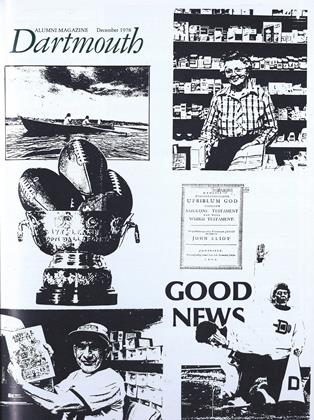I refuse to call this a building year. To say this is a transition year or a building year would be wrong. We're going to do the things we can do best with the people coming back. Our objective is the Ivy League title.
JOE YUKICA realized that goal on November 18 in Palmer Stadium at Princeton. The first-year Dartmouth coach, along with viewers who included a regional television audience, had just watched the Dartmouth football team log its 11th Ivy League championship in 23 years of conference play and its first title since 1973. The 28-21 defeat of Princeton gave the Big Green a 6-1 league record and "undisputed possession of the Ivy trophy.
When Yukica succeeded Jake Crouthamel early last winter, he inherited a team that had an overall record of 6-3 and had finished third in the league with four victories in seven outings. Dartmouth's starting offensive and 'defensive units had only five returning stajrters, and only 19 of 48 lettermen were returning. "In 1978, first-year coach Joe Yukica has his work cut out for him," the Dartmouth football press guide noted.
Following the Princeton game, Yukica was reminded of his February comments about making the Ivy League crown his number one priority. Did he really think this was possible considering the loss of 29 letter-winners? "Yes, I did," he said. "It was based on a couple of facts. One, we had a quarterback who could throw the ball, plus we had some good receivers and some good running backs. Secondly, I was hoping, and it proved true, that there was enough balance in the league so that front- runners Yale and Brown would not go through unbeaten. Penn, Columbia, and Cornell had improved considerably, and I knew that Harvard would have a say about it, too. Early in the season, Columbia beat Harvard and then tied Yale. These things became factors. There are also the intangibles. For example, I feel our team spirit and school spirit are better than anywhere else in the league, and that gets you to play your best. Based on these things, 1 felt we had a very legitimate chance."
The Big Green opened the season with a 31-21 victory over league rival Pennsylvania before falling to Holy Cross, 35-0, and Boston University, 20-17, in nonconference games. Dartmouth sandwiched triumphs over Yale, 10-3, and Cornell, 14-7, around its only league loss, a 24-19 set- back at Harvard, and then traveled to Providence for its showdown against oncebeaten Brown. With the game tied going into the fourth quarter, the Green came up with ten points while shutting out the Bruins to post a 31-21 victory and gain at least a share of the Ivy title. The victory at Princeton was icing on the cake.
The 1978 season was one of records and honors for members of the football team. Heading the list of performers was quarterback Eugene "Buddy" Teevens, whose offense was dubbed "Eugene's Machine." The senior co-captain from Pembroke, Massachusetts, completed 117 passes in 194 attempts for 1,396 yards and four touchdowns. His completions broke the mark of 92 set by Mike Brait in 1975; his attempts eclipsed the record of 172 established by Jack Kinderdine in 1960; and his total yardage surpassed the 1,159 yards gained by Steve Stetson in 1972. Teevens' .618 season completion percentage and career completion percentage of .592 set Ivy League marks. The previous season mark of .610 was set by Dartmouth's Kevin Case in 1976, while the career mark of .571 was established from 1962 to 1964 by Columbia's Archie Roberts.
Against Princeton, Teevens completed 16 of 26 passes for 244 yards. He passed for one touchdown to sophomore Dave Shula and scored two others on runs of five and two yards. He was named the offensive player of the week in the ABC-TV game, for which a $1,000 scholarship will be presented to Dartmouth in his name. New England sportswriters designated him the winner of the Gold Helmet award given weekly to the top New England player. The ECAC also cites top individual perfor- mances in its weekly honor roll. Teevens received that award for his efforts in the Penn, Columbia, Brown, and Princeton games.
Sophomore tailback-fullback Jeff Dufresne set two Dartmouth rushing marks and almost reached a third (see related story below). Shula, son of Miami Dolphin coach Don Shula, caught 49 passes for 656 yards to surpass the 40-reception, 646-yard marks set by Harry Wilson in 1976. Shula caught eight passes against Princeton for 191 yards to top, by 18 yards, the single-game record , set by Tom Fleming in 1975. He was named ECAC rookie of the week after the Princeton game. At Princeton, the televi- sion scholarship award for best defensive player was named for Co-captain Joe Nastri, who was also named the defensive player of the week in the ECAC. Nastri made'the ECAC honor roll for his games against Penn and Columbia.
Yukica declined to single out any one game that contributed to the championship. "Each game had its place," he said. "Every game is a pivotal game when you're going for a championship. It's a tribute to our football team that week after week they came out to play. This was done through a lot of hard work on their part and great leadership from the cocaptains." What's Yukica going to do for an encore during his second year at Dartmouth? "I'm going to do the same thing as this year, although I can't say we're going to win the championship. I'll coach the same way and take the same approach."
 View Full Issue
View Full Issue
More From This Issue
-
 Feature
FeatureCrime and Punishment
December 1978 By Tim Taylor -
 Feature
Feature'Raucous behavior of a different sort'
December 1978 By Mary Ross -
 Feature
FeatureParadise Lost or Paradise Regained?
December 1978 -
 Feature
FeatureGOOD NEWS
December 1978 -
 Article
Article'Most Improved Professor'
December 1978 By NARDI REEDER CAMPION -
 Article
ArticleStraight Shooter
December 1978 By D.M.N.







